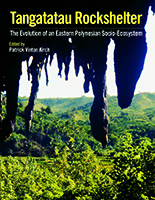Notes
Charcoal from excavation unit D35, Tangatatau Rockshelter (site MAN-44).
Identified by Jon Hather, Institute of Archaeology, London.
Item record
Documentation
Macrobotanical methods
Recovery of macrobotanical remains from MAN-44 was achieved by three methods: (1) individual carbonized specimens were handpicked during excavation or while screening and separately bagged for later identification, (2) bulk samples were taken in the field from what appeared to be particularly rich deposits of carbonized plant materials, and (3) wood charcoal was systematically collected from selected excavation units during sieving. All archaeobotanical materials were sent to Hather at the Institute of Archaeology, London, for detailed laboratory study.
Preliminary examination of all classes of plant remains was carried out under low-power incident light microscopy; identifications based on morphological characters were achieved by the unaided eye or by this method of microscopy. Plant remains requiring examination by higher magnification—potentially identifiable using anatomical characters—were then examined by scanning electron microscopy (SEM) using methods developed by Hather (1991, 1993, 1994).
Wood charcoal from four excavation units (A25, D35, E33, and E34) was identified using epi-illuminated microscopy by comparing archaeological fragments of wood charcoal with modern stained, thin-sectioned, and experimentally charred reference material. Forty woody plant species were collected by Hather and Kirch on Mangaia as the basis for this reference material. For each excavated level within the study units, 50 charcoal specimens were examined and identified (except in cases where fewer than 50 specimens were present in a level).
Reuse
Kirch, Patrick V., 2017. Charcoal, unit D35. https://doi.org/10.25346/S6/MPTFZ0
